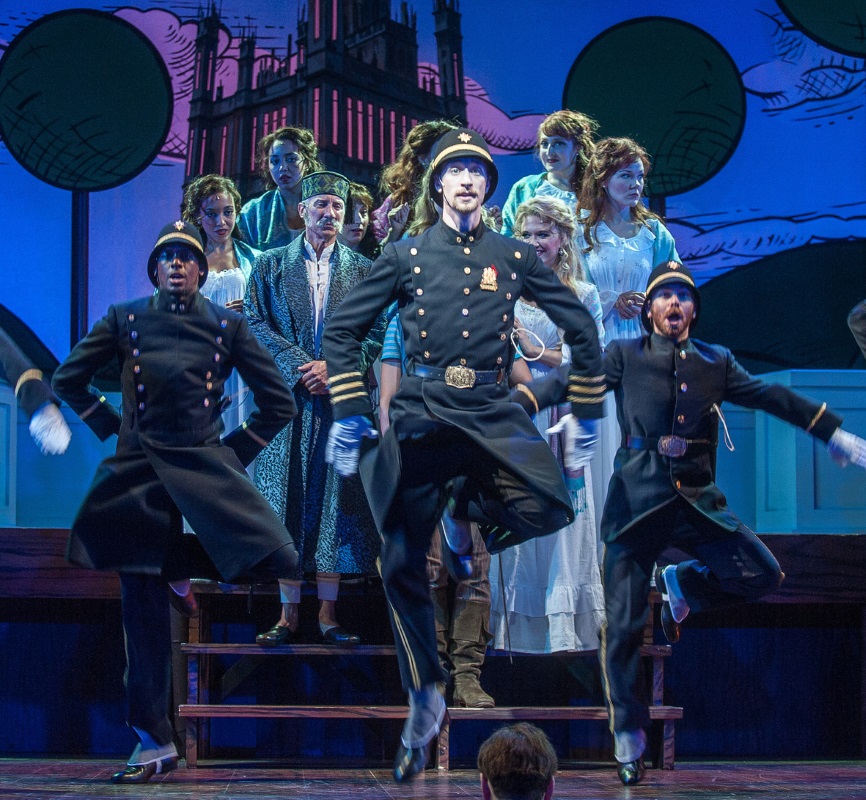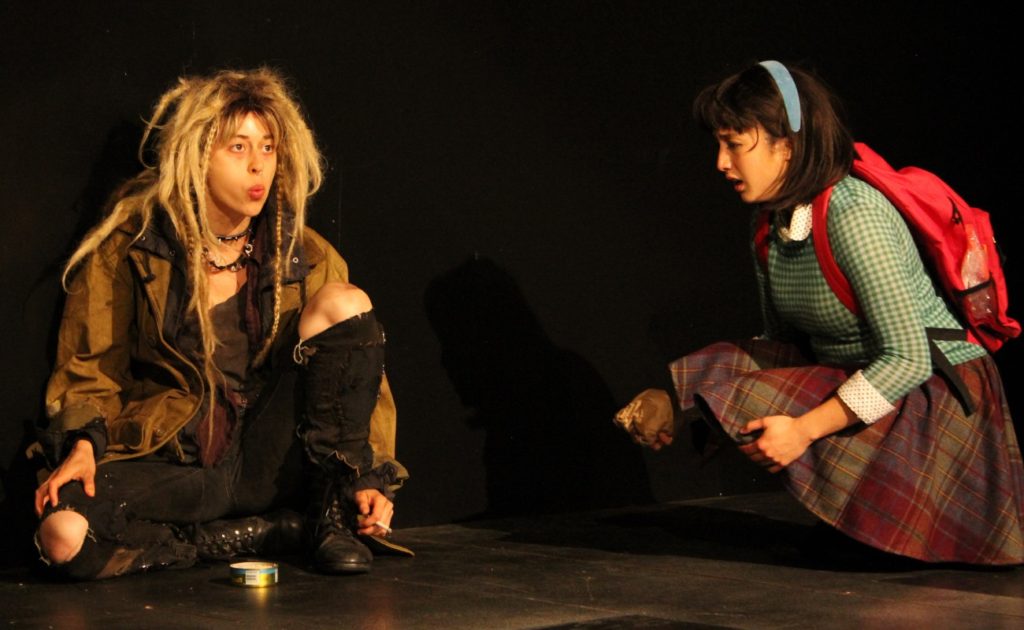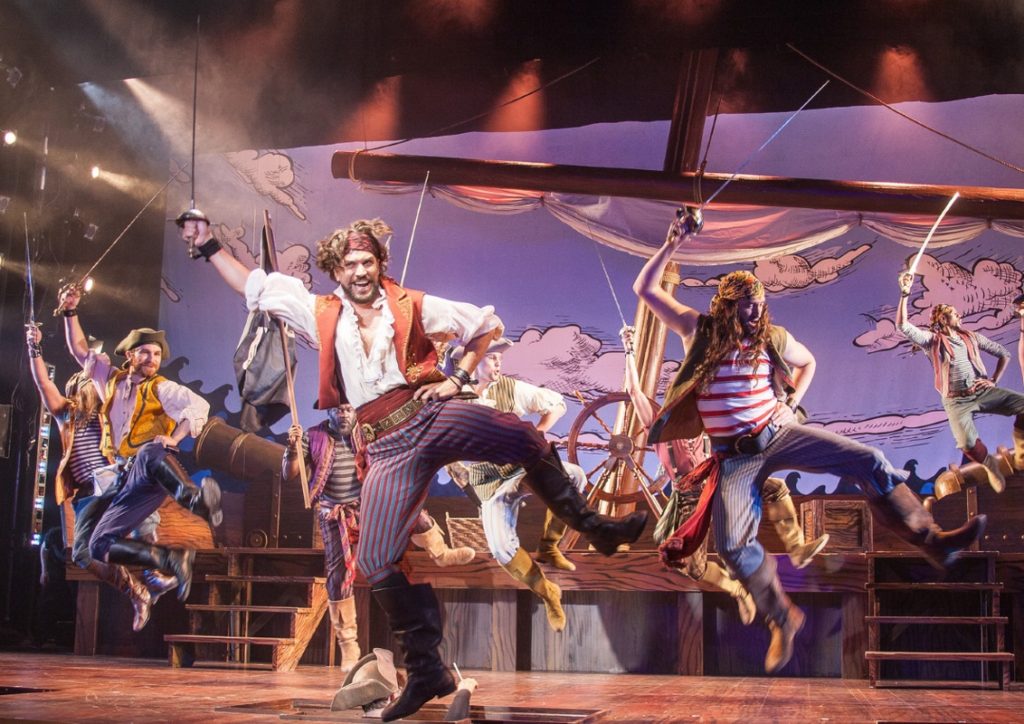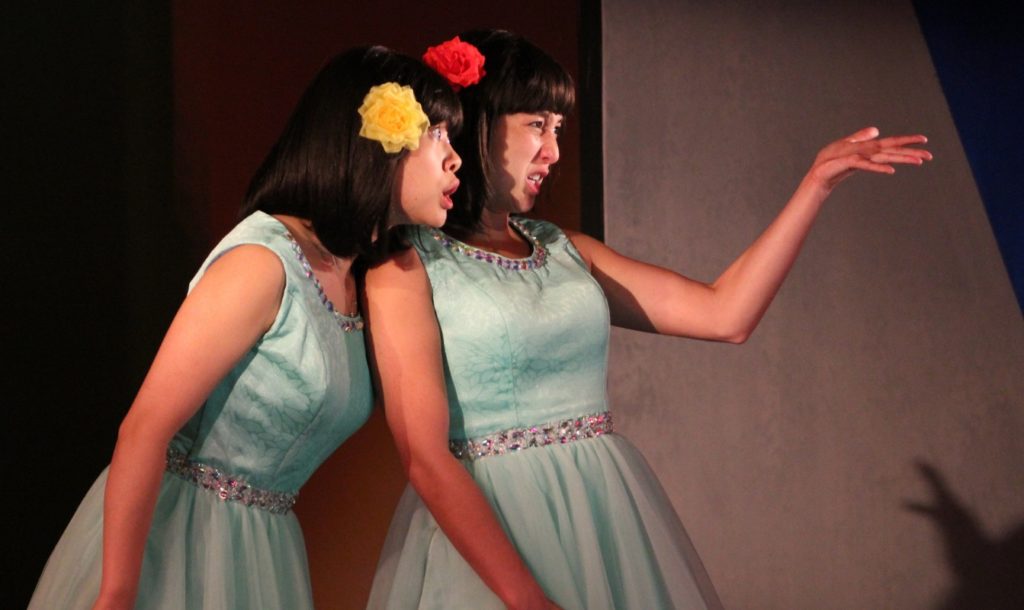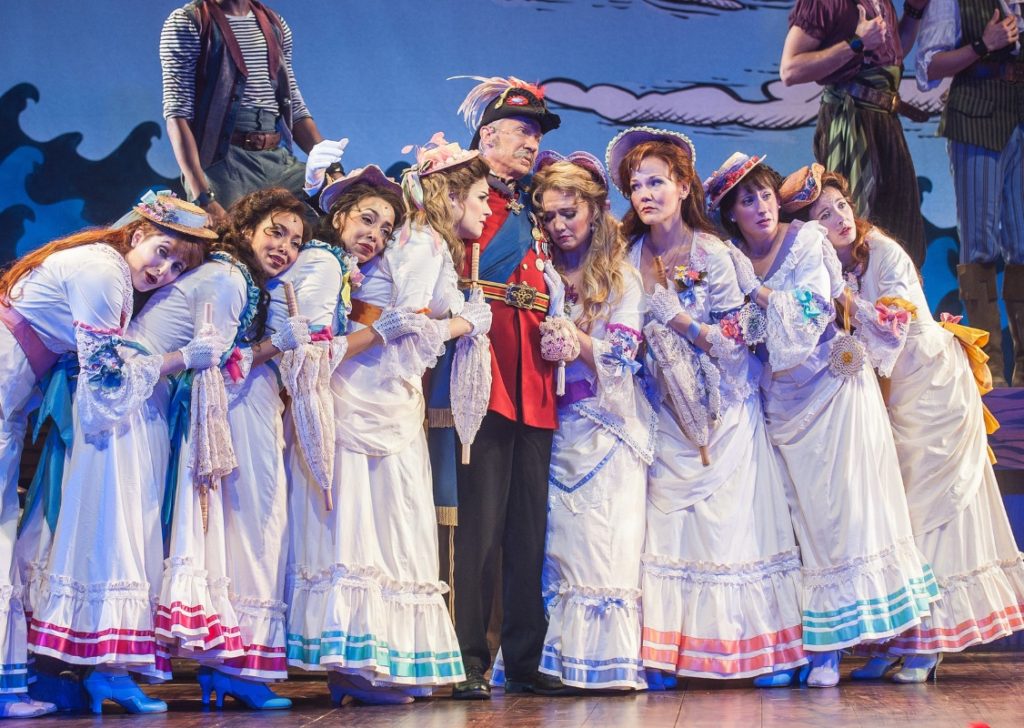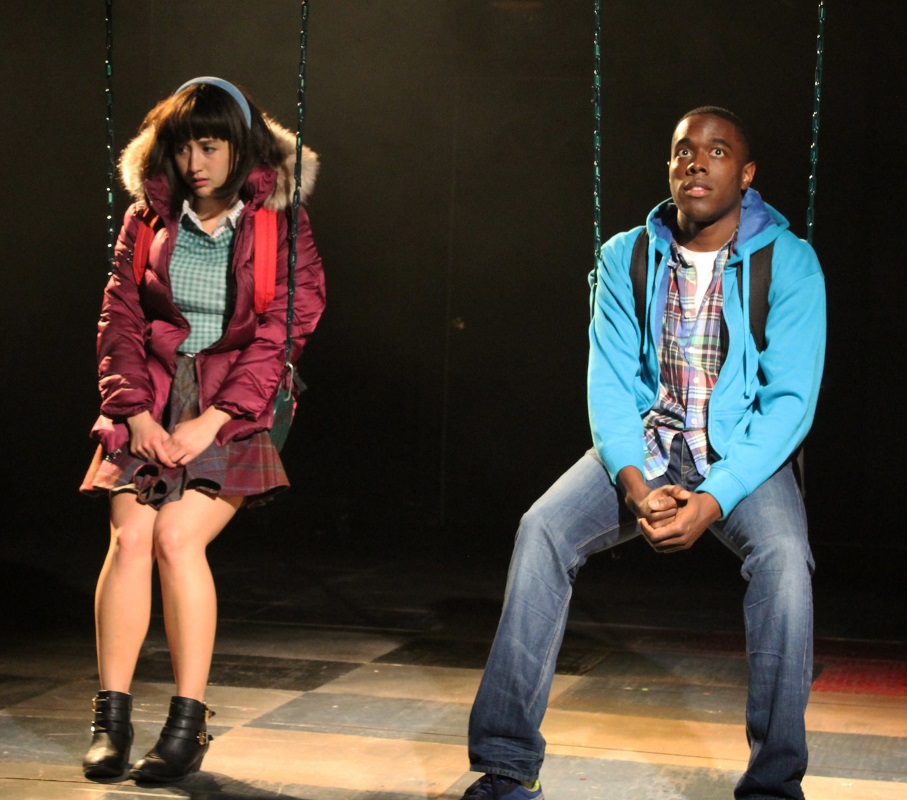Two contradictory things are going on at Pittsfield’s Barrington Stage Company. On the mainstage, the fearsome title characters in The Pirates of Penzance never kill anyone because they can’t bear to harm an orphan and all the captives they seize claim to be orphans. In Peerless, on the company’s second stage, two temporary orphans (well, their mother is out of town) scheme to commit murder because they can’t bear to … not be admitted to the college of their choice.
Peerless is promoted as “a comedy – until it isn’t,” and that’s pretty accurate. Jiehae Park’s brief, pell-mell mirror of Macbeth starts off hijinks-hilarious, then turns increasingly shivery before its creepy-ironic ending.
Identical twins called simply M and L (evoking that Shakespearean Scotsman and his Lady) have meticulously plotted their route to their academic grail, The College, an exclusive institution that admits “only one per year.” Only one “minority,” that is. M and L are Asian – making them “double minorities,” as they say, since they’re girls – and L has dropped back a grade so they can enter sequentially.
 With M’s all-but-perfect grade-point average and lengthy extra-curricular resume, she’s poised to be this year’s pick, but one boy stands in her way – D (for Duncan, naturally). He’s been awarded the minority slot because he’s … well, he’s white, really, but deep in his bloodstream he’s one-sixteenth Native American. From the moment that fat acceptance envelope lands on his doorstep, the girls begin plotting of a different sort.
With M’s all-but-perfect grade-point average and lengthy extra-curricular resume, she’s poised to be this year’s pick, but one boy stands in her way – D (for Duncan, naturally). He’s been awarded the minority slot because he’s … well, he’s white, really, but deep in his bloodstream he’s one-sixteenth Native American. From the moment that fat acceptance envelope lands on his doorstep, the girls begin plotting of a different sort.
Park’s Macbeth mashup pickpockets its source selectively, never sacrificing fun to fidelity, from jokey echoes of the text to Dirty Girl, a stand-in for the three witches, who pelts M with white spitballs chanting “Hail, hail” and issues cryptic prophesies that come all too true. The grab-bag plot doesn’t always make sense, and some sequences needlessly slow the momentum, but Louisa Proske’s nimble staging, aided by John McDermott’s quick-change set of colorful sliding panels, keeps things lively.
For me, the prize of the show is the playwright’s pitch-perfect ear for teenagers’ dialogue and sense of entitlement. The girls’ high-velocity banter, interweaving and overlapping, morphs into conspiratorial certainties that D has to go because “He takes up space that belongs to us.” Sasha Diamond and Laura Sohn are also pitch-perfect as the twins – Diamond’s M hesitant and fearful before finally taking the fatal plunge, with Sohn’s fearless (if not exactly peerless) L egging her sister on.
We buy into the Comedy of Errors convention that the twins are distinguishable only by their color-coded hair ribbons and backpacks, though apart from their blunt-cut do’s the two actresses look quite different. Part of the joke, of course, is the racist cliché that all Asians look alike.
Adina Verson is genuinely creepy and credibly filthy as Dirty Girl and Ronald Alexander Peet, as M’s ex-boyfriend BF, is just the nicest guy you wouldn’t want to see dead. Ethan Dubin is distressingly sympathetic as nerdy, doomed D and horror-movie alarming in a climactic cameo as D’s disabled brother.
The very model of a modern G&S
I’ve been a Gilbert and Sullivan fan forever. I’ve always marveled at the remarkable resiliency of those irrepressible antiques – stubbornly Victorian (but incorrigibly cheeky), full of now-pointless topical jokes and predictable stock characters in ludicrous plots, all riding on catchy ditties and ravishing ballads that stick obstinately in your head.
I’ve also despaired of devoted Savoyards who treat Arthur Sullivan’s music and W.S. Gilbert’s texts as scripture, mounting the shows as fun but fragile museum pieces, and have relished productions that take musical and lyrical liberties. I’ve seen some delightful amateur productions of The Pirates of Penzance over the years, but my yardstick for that show is the 1980 New York Public Theater production starring Kevin Kline and Linda Ronstadt, which rejigged the ending, updated the arrangements with brighter tempos, downplayed the traditional operatic feel and generally raised the energy level.
I’m happy to report that the Pirates now running at BSC fully measures up, not least because it uses the Public Theater score. Apart from the occasional “Arrrr,” there’s no attempt at English accents, except from the couple of cast members who are actually English. And apart from the extraordinary set for the first scene, all the production values are in action onstage.
The play opens not on Gilbert’s seaside beach, but onboard the pira te ship. The narrow deck cleaves the orchestra seating in half (and the orchestra itself is tucked under the stage, with conductor Darren R. Cohen’s head popping out from a hatch in the deck). I was seated right next to the jutting deck and right under a soaring mast and rigging – a little hard to peer around, but great fun to feel part of the action.
te ship. The narrow deck cleaves the orchestra seating in half (and the orchestra itself is tucked under the stage, with conductor Darren R. Cohen’s head popping out from a hatch in the deck). I was seated right next to the jutting deck and right under a soaring mast and rigging – a little hard to peer around, but great fun to feel part of the action.
Under John Rando’s witty direction and Joshua Bergasse’s adroit choreography (they’re the team responsible for BSC’s Broadway hit On the Town) the cast shines in almost every role, from the leads to the comically motley and fetchingly swooning male and female ensembles, respectively.
Kyle Dean Massey is pop-star magnetic as Frederic, who as a boy was mistakenly apprenticed to a pirate (instead of a pilot). I tend to be allergic to sopranos, but Scarlett Strallen, as his peaches-and-cream love interest, held me rapt even – no, especially – when she soared into dog-whistle territory in a delicious coloratura parody.
David Garrison nicely handles the role of dapper, bumbling Major-General Stanley, father of those fetching females, and nails the show’s famous “Modern Major-General” patter song, including the now-standard pause to puzzle over three-syllable rhymes and the snowballing breakneck-tempo encores. Jane Carr is sweet and tart as elderly Ruth, Frederic’s childhood nursemaid and hopeless would-be wife.
For me, the show-stealer is Alex Gibson, as the sergeant of police, head of a squad that belongs less to the Royal Constabulary than to the Ministry of Silly Walks. Rubber-limbed and solemn, he’s extravagantly, sidesplittingly daft while taking himself utterly seriously.
I wish I could say the same for Will Swenson as the Pirate King, one of the most expansively bravura roles in all of G&S. He ‘s got the swashbuckling and swagger, but all I saw was look-at-me-ain’t-I-a-hoot playacting – posing, mugging, all surface and no conviction.
For all the disparity in style, theme and period, Pirates and Peerless have one thing in common: Ryan Winkles. The Shakespeare & Company stalwart is also a freelance fight arranger, and he has staged a couple of battles royal for these shows. In Peerless it’s a biting, scratching, down-on-the-floor brawl between the two sisters, small-scale but ferocious. In Pirates it’s a running, leaping mock-swordfight involving all the buccaneers and ranging over the whole stage, including the ship’s rigging, while I cowered delightedly below.
Peerless photos by Justin Allen
Pirates photos by Kevin Sprague
If you’d like to be notified of future posts, email StageStruck@crocker.com

